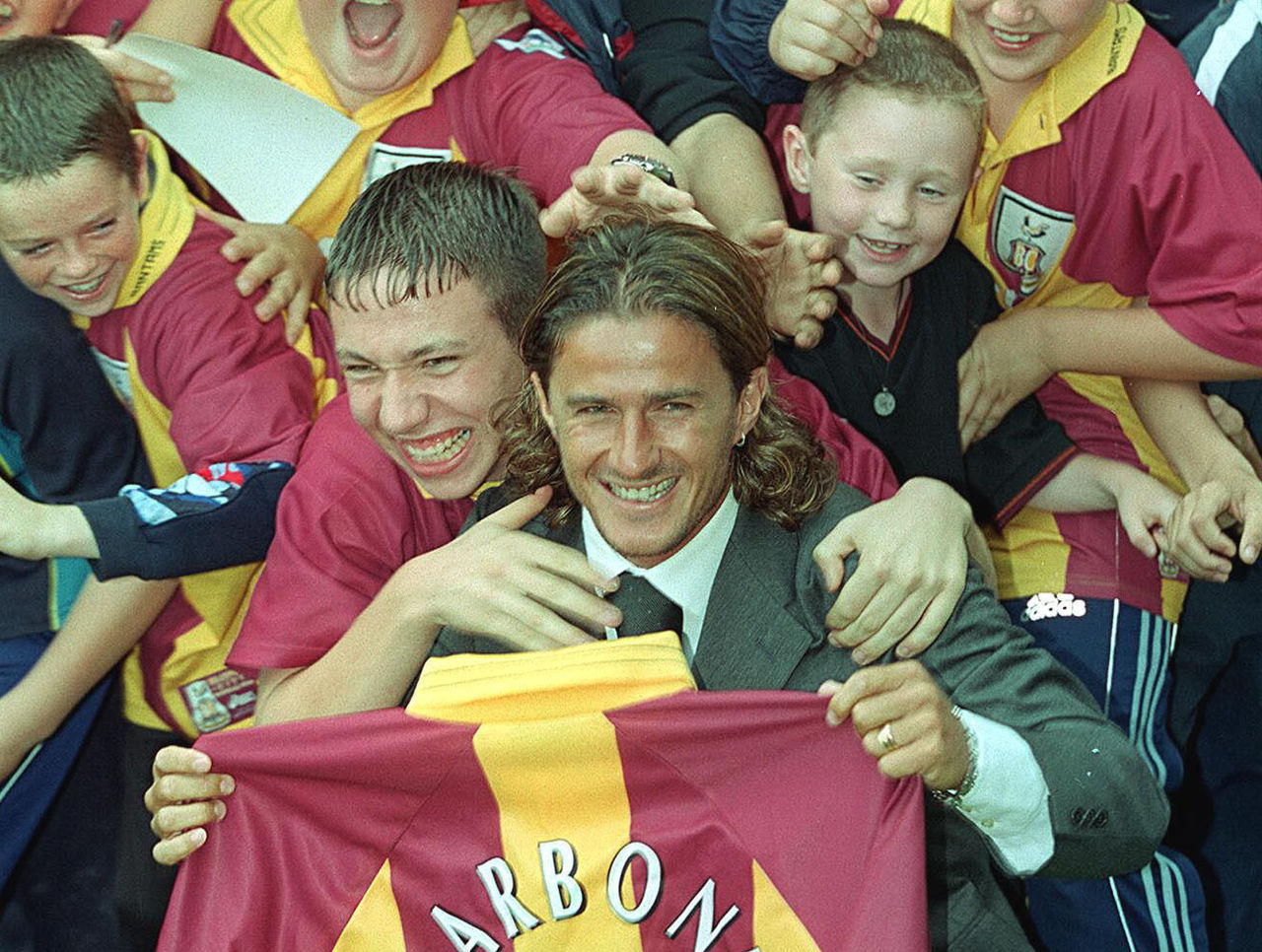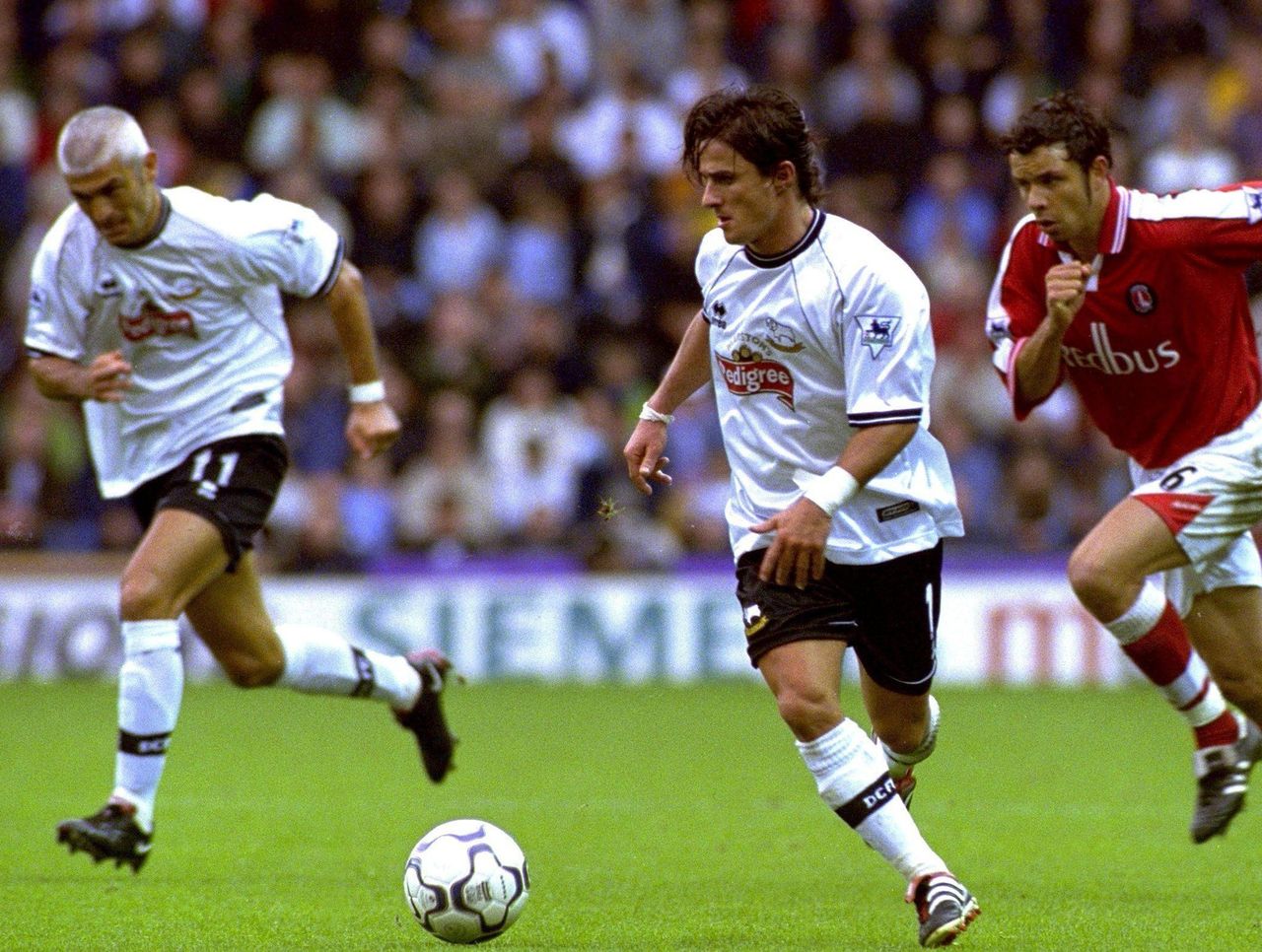16 years on: Benito Carbone bankrupts Bradford
Around the turn of the millennium, Bradford City was so brazenly unfashionable that it could make tracksuited Tony Pulis and his West Bromwich Albion ranks look fit for the catwalks of Milan.
The aged class of 1999-2000, dubbed "Dad's Army" by manager Paul Jewell, eked out top-flight safety on the final day in a 1-0 win over Liverpool.
In that squad was Dean Windass, a man with a physique and appearance more fitting on a Humberside building site than in the burgeoning, international Premier League. Stuart McCall, nowadays in charge at Valley Parade, busied himself underneath his ginger mop, and was later joined in the midfield by the similarly red-topped David Hopkin, who seemed to move in a permanent world-weary waddle.
But, just days before what was seen as an inevitable relegation scrap in 2000-01, chairman Geoffrey Richmond sent fans into a frenzy when he revealed he was on the verge of "the most exciting signing in the history of the club." Suddenly, someone who looked as if he belonged to a Giorgio Armani photoshoot in Italy's fashion hub was about to roll up in the deindustrialised corner of Yorkshire, long frayed by racial tensions.
The mercurial Benito Carbone was charged with bringing some vogue to the colours of claret and amber, penning a contract that eclipsed any other in the dressing room. It was "a move that smacked as much of desperation as ambition," said the Guardian's Dominic Fifield 16 years ago.

"We were desperately anxious to sign him. He's come here for all the right reasons. He's going to be a hero and a superstar here," gushed Richmond.
It was a transfer destined for failure, and one that shook the long-term stability of the Bantams.
Carbone crash
If May's miraculous escape from relegation didn't divert attention from rugby league behemoths Bradford Bulls, Carbone's arrival certainly did the trick.
The diminutive Italian had already proved he can bring glamour to England's more grittier settings in Sheffield Wednesday and Aston Villa. Now Bradford was intended as the next working town to be gaudily accessorized by Carbone's twinkle-toed audacity and penchant of pocketing a screamer.
Carbone was introduced as a substitute shortly after his 29th birthday in the season's opener, and then grabbed his first strike - a well-executed 25-yard swerver - in a superb 2-0 defeat of Chelsea three days later. Pairing the rough (Windass) with the smooth (Carbone) up front, with Lee Sharpe finding pockets on the flank, was showing promise.

But the prediction of Chris Hutchings, the successor of Jewell who departed at the end of the previous season, that Carbone was a 20-goal-a-season forward fell some way short. His derisory five goals were often pleasing on the eye, but he was the team's top scorer in a season where Bradford accounted for the worst attack in the division.
Hutchings was shown the exit door, and midfielder McCall stood in briefly before Jim Jefferies took the helm in November. The managerial merry-go-round had little affect, as the side crashed into the second tier with a 20th-placed finish.
Second tier return
"I have no problem with playing in the First Division," Carbone said ahead of the Bantams' first match of 2001-02.
"It isn't going to be easy, I am sure about that. But we must try to do our best because we want to get back into the Premiership and it is important that we start with a win against Barnsley."
Carbone put in a man-of-the-match performance in a comprehensive 4-0 win, but the cracks were beginning to show. His, along with the arrivals of the lavishly-compensated Dan Petrescu and Stan Collymore in the previous campaign, had left Bradford scrambling for cash.

The flamboyant forward spent a brief spell on loan with Derby County back in the Premier League, but upon returning was subject to a huge falling out as defender Andy Tod was preferred up front over the luxury that was Carbone. Another temporary spell away was brokered at Middlesbrough, but when he returned Bradford's existence was shrouded in doubt.
"He just said to me: 'Benny, we're in trouble. We can't pay you any more,'" Carbone recalled from a phone conversation with Richmond.
"He explained how bad the situation was, and so I said: 'Don't worry, Mr Chairman, I am not going to kill the club.'
"I had two years left, but what could I do? I thought of all the fans who had invited me to functions and given me awards, and I couldn't do it to them. I left without the money I was owed, but with a clear conscience."
Carbone turning his back on a £3.32-million payout was an incredible gesture from a player reaching the twilight of his career, but it sparked the beginning of monetary concerns that ultimately paid Bradford's descent into the fourth tier five years later, and residency in English football's basement division for six seasons.
The supposed saviour for its survival retired from his playing days at AC Pavia in 2010, and has continued his nomadic existence in his later years. Carbone was last in England working behind the scenes at Massimo Cellino's revolving door of Leeds United, spending four months back in Yorkshire before leaving for "family reasons."
Nowadays, Carbone can be spotted showcasing his trademark pluck and plunder at beach football tournaments.
Un orgoglio aver ricevuto il premio come miglior giocatore del torneo! ⚽️ #InterForever #BeachSoccer pic.twitter.com/6tGirYKfpt
— BENITO CARBONE (@carbobenny10) June 12, 2016
HEADLINES
- Man City demolish Al Ain to set up CWC group decider vs. Juventus
- Latest transfer news and rumors: Chelsea turn to Kolo Muani
- Premier League Transfer Tracker: Every deal from the summer window
- Guardiola: Man City squad must be trimmed to keep players happy
- Nuno extends Nottingham Forest contract until 2028